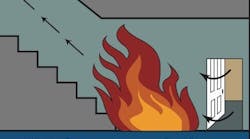May 04--A Facebook page is urging residents to "Back Hutchinson's Bravest" by contacting City Council members to tell them they don't like a proposed change to a sick leave policy that has been a part of the firefighters contract for 40 years.
The council will take up the proposed change, and an independent fact finder's report that said it is unfair when applied retroactively, on Tuesday.
Currently firefighters can accumulate 360 hours of unused sick leave -- plus an additional 36 hours for each year of perfect attendance -- and the city will buy those hours back when the firefighter takes full retirement, disability, retirement or dies.
However, the city, convinced that some employees who have accumulated the maximum number of hours are abusing the sick leave policy by taking time off when they're not really sick, wants to go to a system that would pay the employees at most 33 percent of the hours they've accumulated and then only if they had a low to moderate utilization rate for sick leave.
Firefighters can earn up to eight hours of sick leave a month, or 96 hours a year. The city would buy back 33 percent of the unused sick leave of firefighters who use less than 35 percent of their sick leave over their entire career. The city would buy back 20 percent of the hours for those whose utilization rate was 35 to 39.9 percent and 10 percent of the hours for those whose utilization rate was 40 to 44.9 percent. Those who used 45 percent or more of their sick leave would get nothing upon leaving city employment.
For firefighters, the city also proposed to reduce the number of hours that it would buy back from a maximum of 720 to a new maximum of 544. However, it would make the buyback available to any firefighter with at least five years of service, regardless of whether he is eligible for retirement.
The change is similar to one the City Council voted unanimous to adopt for the Service Employees International Union contract on April 1.
Fire Department Capt. Wes Welker, a representative of Local 179 of the International Association of Firefighters, said the union believes that the change, if made at all, should only apply to new firefighters hired after Dec. 31, 2013, and not applied retroactively to other firefighters, some of whom have been working for the city for 20 years, under contracts that promised the buyback under more generous terms.
Those firefighters, Stewart acknowledged, see the buy back upon retirement as a supplemental retirement benefit.
The city says sick leave is a benefit to ensure income when an employee is unable to work and shouldn't be viewed as a retirement benefit. The city also wants to lower its costs. Since 2009, the city has paid an average of $16,454 a year to buy back the unused sick leave of retiring firefighters.
However, Stewart said the proposed policy would negatively affect most firefighters, especially those with many years of service.
Stewart also argues that the city's proposed utilization rate doesn't take into consideration the unique nature of a firefighter's work. They work 24 hour shifts, so any time they take a "sick day" its 24 hours, not eight. One missed shift a year, he said, means a utilization rate of 25 percent. Two missed shifts are 50 percent, which over a career would mean the city would never buy back any of the firefighter's accumulated sick leave.
Fighting fires is inherently dangerous, and dealing with sick people on medical emergency calls sometimes also exposes the firefighters to disease. And firefighters can't work unless they are 100 percent fit, he said.
Charles Krider, the independent fact finder who heard evidence from the city and the firefighters after an impasse was declared on the sick leave issue, wrote in his report that the city was justified in changing the policy for new employees effective Jan. 1, 2014.
However, he said sick leave hours accumulated before then should be compensated under the terms of the old contract.
The city also is at impasse over the same issue with the Fraternal Order of Police, which represents about 60 officers under the rank of lieutenant.
Sgt. Tyson Meyers, an FOP representative, said that all but about 12 of those officers would be adversely affected by the city's proposal.
There's no timetable for the City Council to take up the FOP contract. The city and the union haven't been to the fact-finding stage. Meyers said the FOP is still waiting on information its attorney has requested from the city, including how much sick leave officers have used under the Family Medical Leave Act and how much they have donated to other officers or other city employees with long-term illnesses that exceeded their annual 96 hours of sick leave.
As with the firefighters, the city proposed to buy back no more than 33 percent of their accumulated sick leave, up to a maximum of 544 hours. To get the maximum buy back, they would need to accumulate more than 1,630 hours of unused sick leave. Exactly how many hours the city would buy back would be based on the same utilization rate as proposed for the firefighters.
Similar to firefighters, most officers don't work eight-hour shifts. Patrol officers, for example, are scheduled for 12-hour shifts. One missed shift a year would be a utilization rate of 12.5 percent; three missed shifts would be a utilization rate of 37.5 percent, which over a career would reduce the hours the city would buy back from 33 percent to 20 percent.
Meyers also questioned why the city would want to reduce a benefit for long-term officers while providing an enhanced benefit to those who work as little as five years.
"Why pay a benefit to a guy who is leaving and then you have to train a new guy?" Meyers said. "Why not benefit the guy who has stayed here his entire career?"
"From my experience, most (new) officers don't use a lot of sick leave their first five years. As you get older you have relatives die or you start having kids and you use sick leave. Now the city wants to give money to guys who have only been here five years. It seems like they're not taking care of the senior guys who have spent their career with the city and were promised this when they were hired."
Many of those older officers, he said, are banking on the lump sum buy back they were promised in earlier contracts to help pay off debts when they do retire.
The city has said it wants to extend the sick leave buy back to those with as little as five years of service, regardless of their eligibility for retirement, because that reflects the modern job environment, in which many employees frequently change jobs and don't spend an entire career with one employer. The national average, the city contends, is for municipal employees to spend only about eight years with one employer.
Copyright 2014 - The Hutchinson News, Kan.





